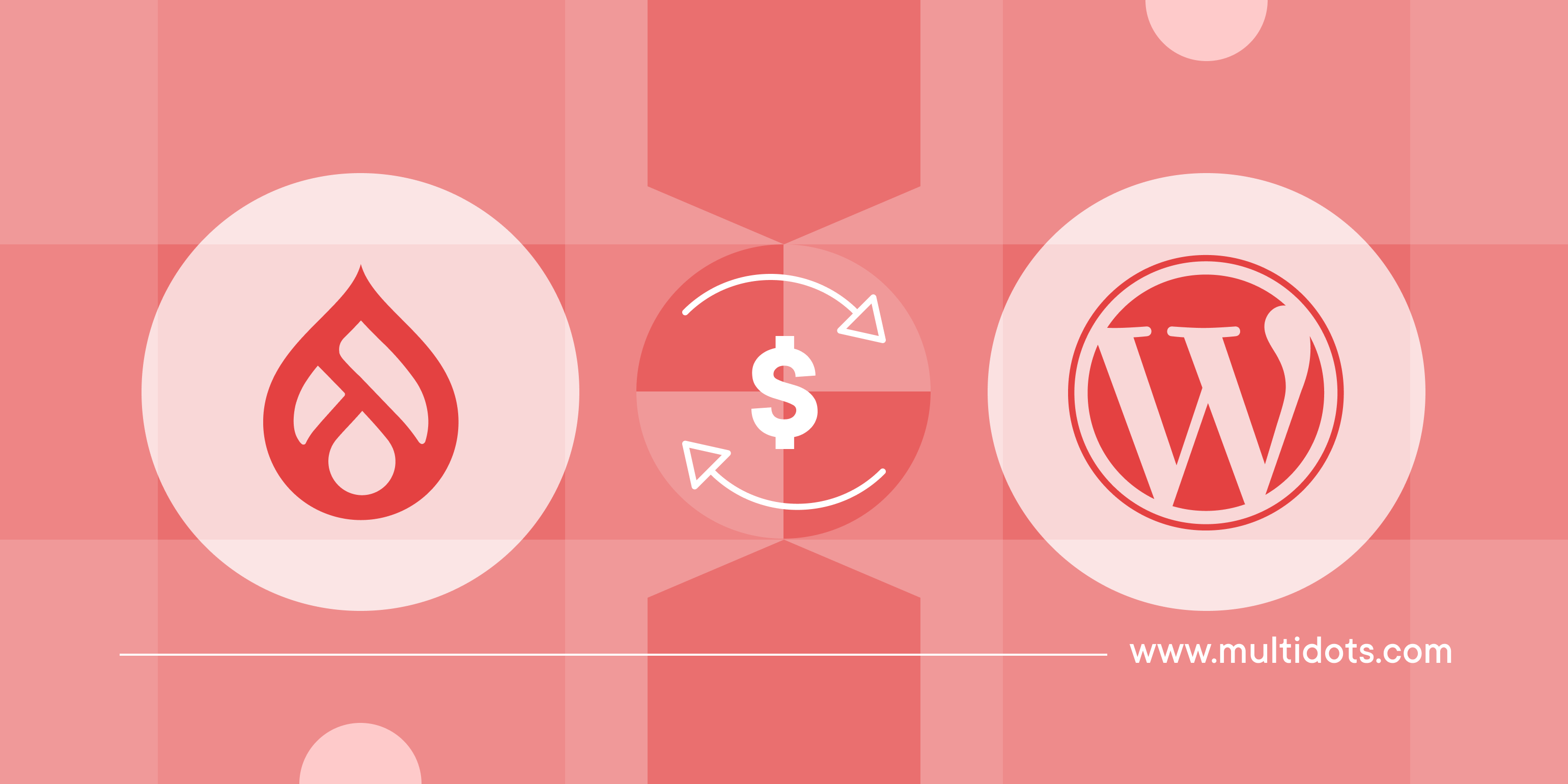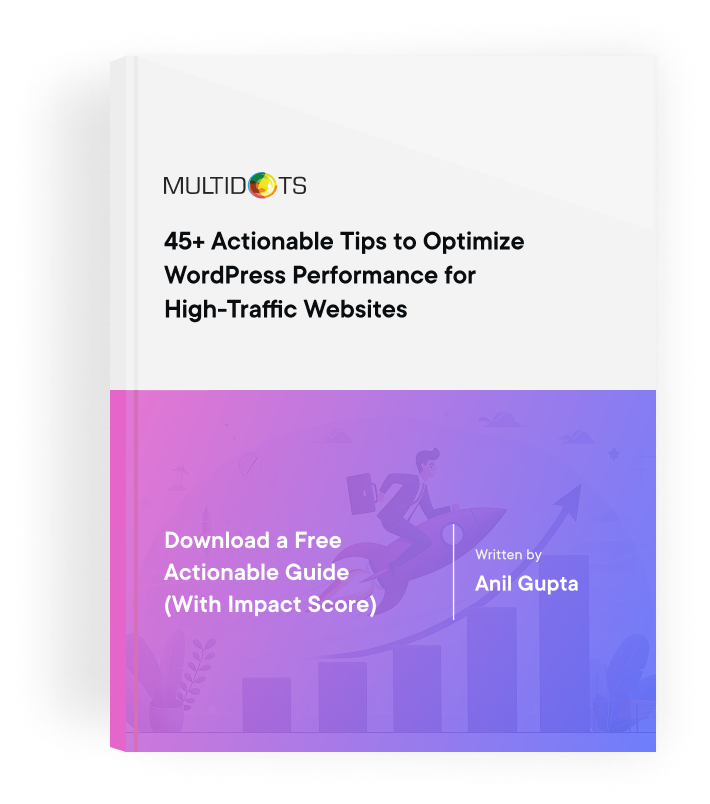Breaking Down the Costs of Moving from Drupal to WordPress
The True Cost of Moving Your Website from Drupal to WordPress

Table of Contents
Thinking of switching from Drupal to WordPress? This article will guide you through the cost considerations to ensure a smooth transition for your business.
Before you make the jump to future-proof your organization’s platform, it is crucial to consider the costs associated with Drupal to WordPress migration. However, since every business or enterprise website is unique, there is no straightforward answer to that.
Fortunately, in this article, we have highlighted all the parameters you need to focus on to get a concrete estimation of Drupal to WordPress migration costs. This will help you massively when planning your CMS migration.
Let’s start by looking at the three fundamental factors.
3 key factors that affect Drupal to WordPress migration costs
The cost to migrate from Drupal to WordPress increases proportionately with:
- The size of the website: If you have thousands of pages, each laden with multimedia and rich content, you have a heavy website. It will require more to back it all up and transfer to the new WordPress CMS, increasing the overall cost of migrating from Drupal.
- The number of custom extensions and third-party integrations: Drupal sites rely on modules and specialized plugins to add more features to a website. Although, WordPress does have a large plugin ecosystem, custom functionalities still need to be built by developers.
- The design complexity: Any kind of animations, themes, and other visual elements that make your current Drupal website aesthetic and easier to navigate through, can incur extra cost when you move them to WordPress.
Don’t get disheartened if you have too many pages or a lot of customization on your existing Drupal website. When you migrate to a flexible CMS like WordPress, you will have an opportunity to re-create them with different technologies, which will save you money down the line.
For instance, if you have a few custom-coded functionalities on Drupal, you may get the same capabilities on WordPress through an already available plugin. Similarly, WordPress does offer a wide array of themes that will reduce migration costs from Drupal.
Direct costs of migrating from Drupal to WordPress
Businesses and enterprises looking to migrate from Drupal to WordPress need to open their wallets for three things during the transition process itself:
- Human resources: This refers to the team of developers, designers, testers, and project managers who will oversee the Drupal to WordPress migration process. If you are planning to do this in-house, you will also need to consider the cost of sourcing and training new team members.
- Data transfer: There are three aspects to it — backing it up securely, moving the data to the new WordPress website, and validating it post-migration. The migration team will need different tools (although there will be some overlaps) and workflows which will incur some cost to the Drupal to WordPress migration process.
- Plugin integration and customization: Here, you need to consider the subscriptions you will pay to certain plugins that you may need and the price of the themes that you have adopted. It’s also possible to design your own theme from scratch (or customize a free one) to avoid the recurring fees, but it will drive up the design costs.
It is crucial to educate yourself about the entire Drupal to WordPress migration process to avoid oversights and inefficiencies. You can learn more about it here.
Hidden costs of migrating from Drupal to WordPress
You probably already know, especially in digital transformation projects, that there are always going to be less obvious expenses that hide under the surface. These will surely inflate the costs of migrating from Drupal to WordPress.
These expenses are often harder to estimate accurately as they depend on multiple factors that are closely related to the industry you are in, the structure of your organization, and more.
Nevertheless, you still need to be aware of them so they don’t catch you by surprise.
- Downtime and business disruption: There will be a period of time in which you can neither use the new WordPress website nor add any new content to the current Drupal website. Depending on your migration team’s expertise, this can range from a few days to a handful of weeks. It leads to operational disruptions, lost opportunities, and more.
- Post-migration adjustments and fixes: "If it can go wrong, it will go wrong." Things like broken links, missing files, and non-responsive design elements could occur in varying degrees on your new website. Fixing them requires a manual approach as they exist sparingly across your website, driving up the Drupal to WordPress migration costs.
- Staff training and workflow modification: Even though WordPress is pretty intuitive, it can still get challenging for older team members who are set in their Drupal ways. Moreover, you will have to tweak your workflows around content creation, approval, and publication to make the most out of WordPress.
Most of the aforementioned hidden expenses can be substantially reduced by offloading this migration project to a certified and experienced Drupal to WordPress migration agency.
The downtime and operational disruption, for instance, will be minimal and you will be informed way ahead of time. This will allow you to communicate with all the stakeholders in advance to minimize the impact on your business performance.
Moreover, there will be fewer mistakes during the Drupal to WordPress migration as it will follow a tried and tested workflow, managed by experts.
Similarly, experienced WordPress agencies like Multidots can vigilantly track and resolve any post-migration issues instantly while providing support to your team.
Anyway, after going through all kinds of expenses, one big question comes to mind: is it all worth it?
Cost-benefit analysis of Drupal to WordPress migration
A well-executed Drupal to WordPress migration can result in long-term cost savings and operational improvements for businesses and enterprises. Let’s understand how by looking at three areas where WordPress outshines Drupal:
- Development and maintenance: WordPress users are less reliant on developers to update their CMS. Even in cases where you do need specialized support, specialized WordPress developers are more affordable than their Drupal counterparts. Moreover, you can always get help from its large global community.
- Content management: WordPress’ user-friendly interface makes it easier for everyone to learn how to create and edit drafts and pages. Frankly, you can learn how to publish content on WordPress in five minutes, without anyone’s help. This makes it easier for adoption, and even new team members can seamlessly fit in.
- Future-proof: The web is an evolving space and using the most popular CMS in the world, by a mammoth margin, has its advantages. You won’t be dependent on external developers to install new plugins to gain new functionalities, even if they are AI-powered features. This isn’t available on Drupal.
Simply put, businesses and enterprises can transform their current Drupal website into a low-maintenance, more user-friendly, and easily scalable website with WordPress. This makes the cost of Drupal 7 to WordPress migration worth it.
Looking ahead: Migrating from Drupal to WordPress
Migrating from Drupal to WordPress comes with a bunch of direct and hidden costs. However, the ROI is worth it for businesses and enterprises due to the scalability, user-friendliness, and flexibility offered by WordPress.
Teams can consider performing the CMS migration in-house by onboarding new professionals specializing in CMS, testing, and data handling. This gives a lot of freedom and customizability but could be slower, error-prone, and costly.
Truth be told, organizations that need to make the CMS transition quickly and hassle-free are better off partnering with experienced WordPress migration agencies.
Multidots’ team has helped many businesses and enterprises migrate from Drupal to WordPress seamlessly while keeping everything affordable. You can also expect continued support from our team to help your employees get up to speed with the new WordPress website.
Ready to make the jump? Contact us today.
FAQs
-
The cost of migrating from Drupal to WordPress depends on several factors including website size, design complexity, and the degree of customization. Usually, it costs at least a few thousand dollars.
-
Based on factors like size and complexity, the Drupal to WordPress migration process can range from a few weeks to several months. One effective way to get it done quickly is by partnering with experienced migration experts like Multidots.
-
Yes, a well-executed migration from Drupal to WordPress can be carried out without any data loss or decrease in search engine rankings. However, customer extensions and functionalities require special attention as they are moved to WordPress.
-
Handling custom modules, ensuring design consistency, managing downtime, addressing compatibility issues with third-party extensions, and training employees are some of the key challenges teams can expect during Drupal to WordPress migration.
-
Yes. WordPress developers’ affordability, extensive plugin repository, vast free theme options, a larger community, and limited reliance on technical staff make WordPress more cost-effective to maintain compared to Drupal.
Feel free to schedule a quick call with our migration expert.
Contact Us
